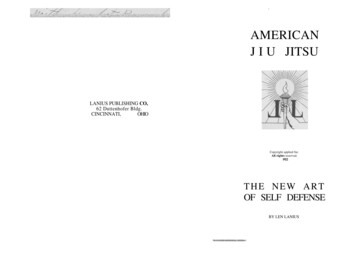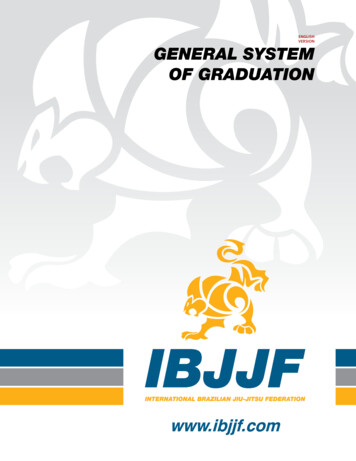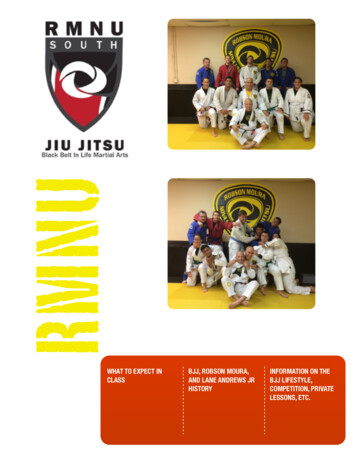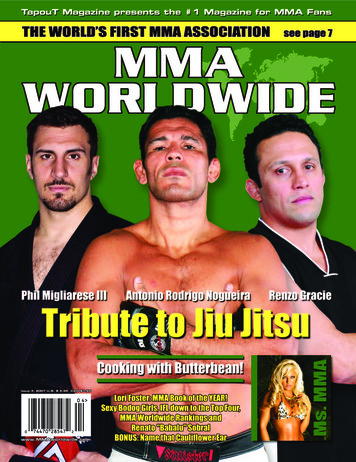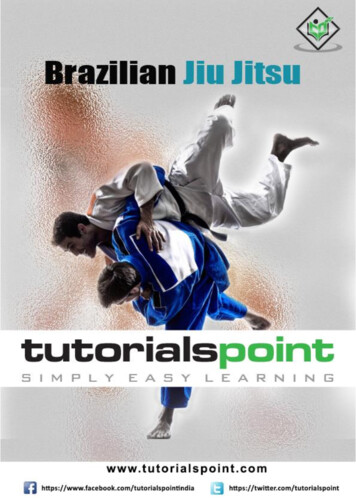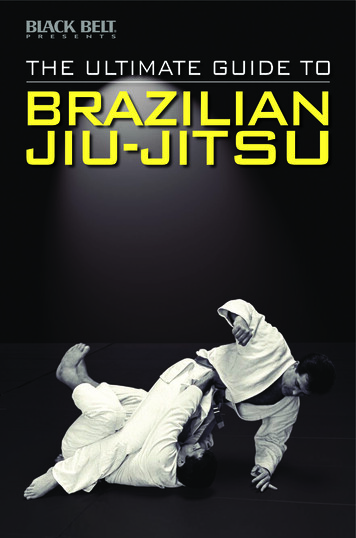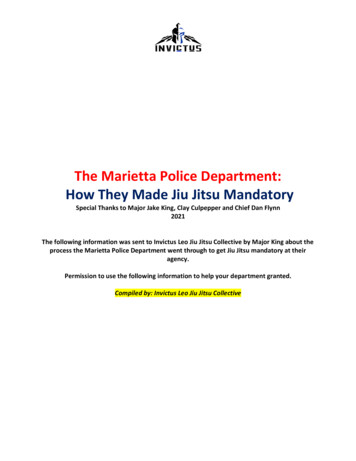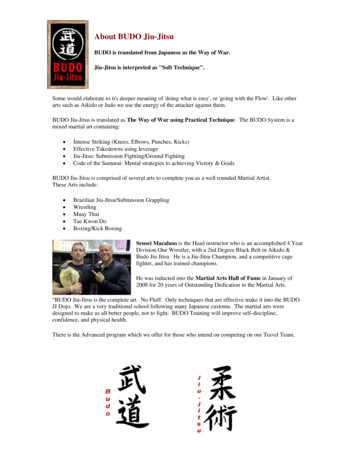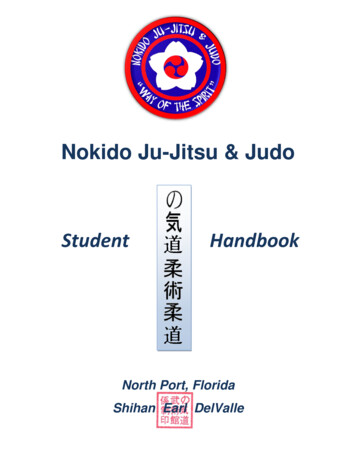
Transcription
Nokido Ju-Jitsu & JudoStudentHandbookNorth Port, FloridaShihan Earl DelValle
HISTORY OF JU-JITSU AND NOKIDO JU-JITSUJu-Jitsu (Japanese: 柔術), is a Japanese Martial Art and a method of self defense. The word JuJitsu is often spelled as Jujutsu, Jujitsu, Jiu-jutsu or Jiu-jitsu."Jū" can be translated to mean "gentle, supple, flexible, pliable, or yielding." "Jitsu" can be translatedto mean "art" or "technique" and represents manipulating the opponent's force against himself ratherthan directly opposing it. Ju-Jitsu was developed among the samurai of feudal Japan as a method fordefeating an armed and unarmed opponent in which one uses no weapon. There are many styles(ryu) and variations of the art, which leads to a diversity of approaches, but you will find that thedifferent styles have similar, if not the same techniques incorporated into their particular style. Ju-Jitsuschools (ryū) may utilize all forms of grappling techniques to some degree (i.e. throwing, trapping,restraining, joint locks, and hold downs, disengagements, escaping, blocking, striking, and kicking).Japanese Ju-Jitsu grew during the Feudal era of Japan and was expanded by the Samurai Warriors.The first written record of Ju-Jitsu was in 1532 by Hisamori Takeuchi. Takenouchi Ryu Ju-Jitsu is theoldest style of Ju-jitsu and is still practiced in Japan. There are hundreds of different Ju-Jitsu stylesthat have been documented and are practiced today, one of which is our modern style of Ju-Jitsu,Nokido Ju-Jitsu.Ju-Jitsu is said to be the father of all Japanese Martial Arts. Today, Ju-Jitsu is practiced in bothtraditional and modern sport forms. There are many forms of Sport Ju-Jitsu, One of the most commonis (MMA), Mixed Martial Arts-style competitions such as Jujitsu fighting and Sport Ju-Jitsu, wherecompetitors apply a variety of strikes, throws, and holds to score points. There are also katacompetitions, where competitors of the same style perform techniques and are judged on theirperformance. There are also freestyle competitions, where competitors take turns attacking eachother, and the defender is judged on performance. Other sport forms include the Olympic sport andmartial art of Judo, which was developed by Jigorō Kanō at the Kodokan in 1882, from severaltraditional styles of Ju-Jitsu and introduced to the Olympics in 1964, Aikido which was developed byMorihei Ueshiba in 1942, and Brazilian Jiu-Jitsu, which was in turn derived from earlier (Pre–WorldWar II) versions of Kodokan Judo taught by Mitsuyo Maeda and developed by Helio Gracie and theGracie Family and established in 1925.A common word for Brazilian/Modern Jiu-Jitsu is “Jitz”. The term “Ju-Jitsu” was not coined until the17th century, after which time it became a blanket term for a wide variety of grappling-relateddisciplines, it was originally called Yawara. Older forms of Japanese Ju-Jitsu were called Koryu,Modern forms of Ju-Jitsu are called; Gendai Ju-Jitsu. Hanshi Gruenwald originally spelled the wordJu-Jitsu; Jujutsu. Shihan DelValle changed the spelling to the more commonly used Ju-Jitsu. Whenreferring to Nokido Ju-Jitsu, either usage is correct. The spelling of the word “Jiu-Jitsu” is nowcommonly used for all Jiu-Jitsu styles and specifically for describing Brazilian Jiu-Jitsu.Jigoro Kano – Judo FounderHelio Gracie – Gracie Jiu-Jitsu FounderMorihei Ueshiba – Aikido Founder
Hanshi Andrew GruenwaldThe Director of Nokido Ju-Jitsu in the United States, Hanshi AndrewGruenwald (1942-2000), brought Nokido Ju-Jitsu from Japan to the UnitedStates. Hanshi Gruenwald studied the Martial Arts while stationed in Japanserving in the U.S. Army. Hanshi Gruenwald made frequent trips back toJapan to continue his studies after returning to the United States to pursue acareer in Law Enforcement. Hanshi Gruenwald opened two Martial Artschools in the Chicago Area. Hanshi Gruenwald was a Hachidan, (8th DegreeBlack Belt) in Nokido Ju-Jitsu and Isshin –Ryu Karate and a Shichidan (7thDegree) in Judo. Shihan Gruenwald was posthumously promoted to Hanshi,9th Degree Black Belt, by Nokido Ju-Jitsu in 2010.Hanshi Gruenwald improved Nokido Ju-Jitsu by blending the best techniques from all of the differentstyles of Martial Arts that he studied together into one efficient system and Shihan DelValle continuedwith that tradition, to form the modern efficient version of Nokido Ju-Jitsu practiced today. Moderntechnology comes to Martial Arts, evolution comes to Ju-Jitsu through the Nokido style.Nokido Ju-Jitsu is a traditional Japanese style of Ju-Jitsu that has evolved from many years ofresearch and studies into a modern form of Ju-Jitsu. The techniques are formatted into a system forefficiency and easier comprehension and they will evolve based upon the development of our style,needs of the Instructors, students, feedback, and our mistakes.Hanshi Gruenwald passed away from a cancerousbrain tumor in 2000, although much of its history waslost, Nokido Ju-Jitsu can be traced to the NokidoShrine in the town of Kamo-Cho, located in theOkayama prefecture, now named Tsuyama. TheNokido Shrine was built in June of 714 and rebuilt aftera flood in June of 1184. The shrine was named afterthe Nokido pine tree that saved a locally worshipedDeity (Nokido-Miya) from being swept away in theflood. The shrine remains in Tsuyama city today.Nokido Ju-Jitsu was named after the Nokido shrinejust as many styles of Ju-Jitsu were named from thelocal shrines and towns that they were located in.(Shrine - 65 Tacchu, Kamo Cho, Tsuyama City 0868-42-3184)Nokido Ju-Jitsu is a comprehensive way to learn, understand, and teach Ju-Jitsu, as HanshiGruenwald and Shihan DelValle intended it to be. “I did not invent Ju-Jitsu, I simply made it better” Helio Gracie. Nokido Ju-Jitsu has revolutionized the way that Ju-Jitsu is studied and practiced byupdating and improving the curriculum to meet the modern needs of the students as well as theInstructors. Nokido Ju-Jitsu continues to move forward through its students and teachers. As theyprogress and improve, so will the style of Nokido Ju-Jitsu, “The way of the Spirit”.Shihan Earl DelValle
Shihan Earl DelValle - BiographyShihan Earl DelValle’s martial arts journey began in 1987 after wrestling in highschool. Shihan DelValle began studying Judo at the Sarasota Academy under ReneDuchesne until November of 1990, when he enlisted in the Navy. While stationed inSan Diego, California, Shihan DelValle continued his Judo and Ju-Jitsu training as amember of the All Navy Judo team.In 1991, after a transfer to the Great Lakes Naval base, he met Shihan AndrewGruenwald, who taught Judo and Nokido Ju-Jitsu. Despite a subsequent transfer toVirginia Beach, Virginia, Shihan DelValle continued to train under ShihanGruenwald, while also studying Karate and teaching Judo and Ju-Jitsu at theKyoshinkan Karate School, under Lenny Jordan.Upon his discharge from the military in 1994, Shihan DelValle returned to his hometown of Sarasota, Florida,and continued to study and teach Judo, Ju-Jitsu and Karate, eventually opening his own school in 1995 underthe direction of his instructors.In 1996, Shihan DelValle began a law enforcement career with the Manatee County Sheriff’s Department.Shihan DelValle continued his Martial Arts studies and his teaching of Ju-Jitsu and Judo at his school, until1998 when he transferred to the Sarasota Police Department to become a Patrol Officer.In 2000, Hanshi Gruenwald passed away from a cancerous brain tumor. Hanshi Gruenwald named ShihanDelValle his successor to Nokido Ju-Jitsu and the United States Director of Nokido Ju-Jitsu.In 2001, Shihan DelValle began to study Brazilian Jiu-Jitsu at Wolfpack BJJ. This year also saw ShihanDelValle and Nokido Ju-Jitsu officially certified by the United States Ju-Jitsu Federation (USJJF.)In 2002, Shihan DelValle taught Ju-jitsu, Judo and Karate at the Sarasota Alliance Church. He was alsopromoted to Vice President of United States Ju-Jitsu of Florida, and also became a member of the SpecialOperations Division-Explosives Material Unit for the Sarasota Police Department.In 2003, Shihan DelValle was promoted to Detective for the Sarasota Police Department, and also awardedthe United States Ju-Jitsu Federation’s Instructor of the Year Award. Shihan DelValle assisted teaching Judoand Ju-Jitsu at the Y.M.C.A. in Sarasota and Defensive Tactics to police officers, as well as study Brazilian Jiujitsu with Professor Charles Dos Anjos.In 2004, Shihan DelValle was promoted to Blue Belt in Brazilian Jiu-Jitsu by Professor Dos Anjos.In 2005, Shihan DelValle relocated his Ju-Jitsu and Judo class to the YMCA in Sarasota. This year also sawpromotions to Godan (5th degree black belt) in U.S. Ju-Jitsu and Nokido Ju-Jitsu, and Yondan (4th degree blackbelt) in Karate and USA Traditional Kodokan Judo.In 2006, Shihan DelValle was certified by USA Judo, the national governing body for Judo, and also certifiedas a USJJF Referee. Tragically, Shihan DelValle was also severely injured in the line of duty, an event thatprecipitated several months of physical therapy. It was during this time that Shihan DelValle started the InternetCrimes Against Children unit for the Sarasota Police Department.In 2007, Shihan DelValle was appointed to the USJA Technical Official committee, certified as a Judo Referee,and awarded a meritorious service medal by the SPD. Shihan DelValle began to teach full time at the currentNorth Port Nokido Ju-Jitsu location.In 2008, Shihan DelValle was promoted to Yodan for USJA Judo and purple belt in Brazilian Jiu-jitsu. However,he was also forced to retire from his law enforcement career due to the injury received in the line of duty.
In 2009, Shihan DelValle was promoted to Shihan (Master) in Kyoshinkan Karate. At the USJJF awardsbanquet, he was recognized for leadership in the state of Florida, and coached the 2009 U.S. Ju-Jitsu NationalChampionship. This year saw his promotion to Rokudan (6th degree black belt) in U.S. Ju-Jitsu and Nokido JuJitsu by the USJJF, and Godan (5th degree black belt) in USA Traditional Kodokan Judo.In 2010, Nokido Ju-Jitsu was recognized by Jujitsu America. Shihan DelValle was recognized by the UnitedStates Judo Association’s Ju-Jitsu Division as a Rokudan and Master Examiner in USJA Ju-Jitsu. He was alsorecognized by USA Judo, as a Yondan. 2010 also saw Shihan DelValle and the Nokido Ju-Jitsu Yudanshaposthumously promoted Shihan Andrew Gruenwald to Kudan (9th degree black belt) in Nokido Ju-Jitsu.In 2011, Shihan DelValle was recognized by the International Judo Federation and the Pan American JudoConfederation as a Yondan. Shihan DelValle also became a registered purple belt under the InternationalBrazilian Jiu-Jitsu Federation.In 2012, Shihan DelValle coached 20 Members of Nokido Ju-Jitsu to become the Jujitsu America NationalChampions in fighting and self defense. Shihan DelValle taught at the National Convention and wasrecognized by Jujitsu America as a Godan and Instructor. Shihan DelValle was also certified by USA Judo inVisually Impaired Coaching. Shihan DelValle became an Instructor in Brazilian Jiu-Jitsu and Nokido Ju-Jitsubecame a certified Wolfpack Brazilian Jiu-Jitsu affiliate and training center.Despite the fact that Shihan DelValle is physically disabled, he chooses to focus on his abilities and continuesto serve Nokido Ju-Jitsu and his students with his instructional ability, coaching, refereeing, technical training,and management and likes to just be called; Sensei. Shihan DelValle continues to teach Ju-Jitsu, Judo andBJJ in North Port, Fl. at Nokido Ju-Jitsu & Judo. Shihan DelValle is the United States Director of Nokido JuJitsu.Shihan DelValle is a member of:United States Judo Association (USJA Ju-Jitsu Rokudan and Master Examiner, Judo Yodan, Bronze LifeMember, Referee, National Coach, Technical Official & Supervisor, Kata Certified, Certified Instructor)United States Ju-Jitsu Federation - (Rokudan--U.S. Ju-Jitsu, Nokido Ju-Jitsu, Silver Life Member, SeniorInstructor/ Examiner, Referee)Jujitsu America (Godan, Instructor, National Champion, Recognized Nokido Rokudan)IJF, USA Judo (Yondan, National Coach and VI Coach)Brazilian Jiu-Jitsu (IBJJF, Purple Belt 4th Degree, under Charles Dos Anjos)Kyoshinkan Karate (Yondan, Shihan)Fugakukai Aikido (Nidan)FL. Dept. of Law Enforcement (Certified Defensive Tactics & Ground Fighting Instructor)Shihan Earl DelValle can be reached by email at: budobug@gmail.com
SENSEI CHRIS RITCHIE - BIOGRAPHYSensei Chris Ritchie was born in Bangkok, Thailand and moved to the United States ata young age. Sensei Ritchie grew up playing competitive organized sports and enjoyscompetition. Sensei Ritchie started his martial arts journey when he moved to Floridain 2005. Some of Sensei Ritchie’s passions include, cooking, hunting, fishing, andanything martial art related. Sensei Ritchie is married and his wife also practicesNokido Ju-Jitsu and Judo. Sensei Ritchie and his wife were founding members of theSpecial Team of Role Models (Storm Team).Sensei Ritchie began to study Martial Arts at the North Port Family YMCA with SenseiPaul Lockwood, a certified Black Belt under Shihan DelValle. Sensei Ritchie instructedclasses at the YMCA as an orange belt when Sensei Lockwood moved to Sarasota topursue a law enforcement career. Sensei Ritchie taught at the YMCA until Shihan DelValle agreed to helpSensei Ritchie continue teaching classes in North Port. Sensei Ritchie is an excellent instructor and iscontinuing his education in Martial Arts while teaching classes with Shihan DelValle. Sensei Ritchie hasstudied Nokido Ju-Jitsu & Judo and continues to pass on his knowledge of Nokido techniques in their purestform.Sensei Ritchie is nationally certified by the USJJF, Jujitsu America, Wolf Pack BJJ and the USJA. SenseiRitchie accomplishments include, 2007 Disney Martial Arts Festival Gold medalist in Gi Grappling, 2008Disney Martial Arts Festival Silver medalist in Sport Ju-Jitsu, 2009 Gold medalist and National Champion forth
Morihei Ueshiba in 1942, and Brazilian Jiu-Jitsu, which was in turn derived from earlier (Pre–World War II) versions of Kodokan Judo taught by Mitsuyo Maeda and developed by Helio Gracie and the Gracie Family and established in 1925. A common word for Brazilian/Modern Jiu-Jitsu is “Jitz”. The term “Ju-Jitsu” was not coined until the 17th century, after which time it became a blanket .
